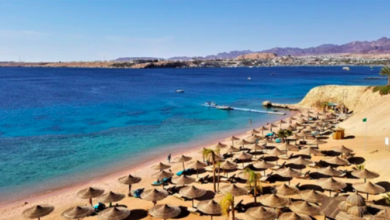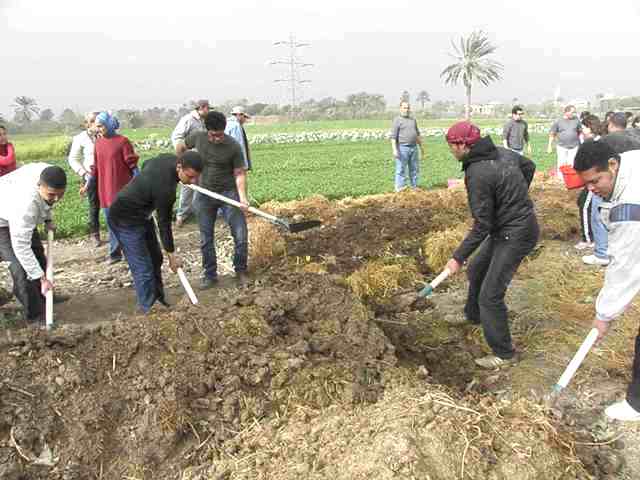This article is part of the series launched by Al-Masry Al-Youm English Edition in collaboration with the Wadi Environmental Science Centre (WESC) ahead of the World Environment Day (WED) that will take place on 5 June and will be organized by WESC at Al-Azhar Park. The series covers the topic of the 2011 WED, which is “land usage and food security.”
For the last 15 years, South African Dominique De Bruin has been studying, practicing and delivering permaculture solutions to various communities around the world. He has studied with the top permaculturists in Australia, as well as pioneered and developed fully realized systems throughout South Africa.
De Bruin gave an introductory presentation and workshop on permaculture, organized by Nahdet al-Mahroussaat, Wednesday evening, at St. Andrews Church in downtown Cairo.
Al-Masry Al-Youm had the unique opportunity to meet with Dominique in person to unveil what permaculture is really about.
Al-Masry Al-Youm: What is permaculture?
Dominique De Bruin: In essence, permaculture is a design methodology applied to create sustainable ecosystems for human use and habitation – the goal is to create self regulating systems that produce as many of their own inputs as possible, as well as produce more energy than they consume. The best way to design these systems is to mimic nature, and to do so, we draw on the best of green architecture, modern eco-housing, organic gardening and farming and the best of agroforestry to create low impact, clean and safe energy efficient environments.
Al-Masry: What do you mean by mimic nature?
De Bruin: Well, nature, to illustrate the point with a few ecological principles, always works in cycles. But our current human activity breaks these cycles; for example, we use non-renewable energy sources, or we extract nutrients and minerals from the soil and never put them back – so the current methods are more like life support systems rather than ecosystems. But if you look at nature, it’s constantly recycling itself effortlessly. So we aim to mimic that by creating systems that can carry us indefinitely, whilst in harmony with the natural world, and it’s totally achievable.
Al-Masry: Could you run through what a typical permaculture would consist of?
De Bruin: Well of course there are different strategies that we use depending on location, whether urban or rural, size, climate etc.
But in an urban area like Cairo, a typical permaculture garden would focus heavily on utilizing and maximizing vertical space by covering buildings and rooftops with plants. But the difference with permaculture is that we try to make everything multifunctional. So it’s not just plants, but plants that can harvest fruits. But the plants could also be fertilized by installing microorganism soil preparations, which would then be watered using recycled and filtered water supplies. And then you could also use the rooftops to harvest bees to create honey and wax productions etc.
Al-Masry: And if it was larger scale? Or in a rural area with more land?
De Bruin: Well then you have a lot more free reign. You can cultivate an entire ecosystem. You can plant trees, and incorporate animals like chickens or ducks, which would then create proper compost. And you could install solar panels, to power your house and heat your water, which would then be recycled and redistributed right back into the system. You can literally just keep building until your system, and hence your permaculture, is entirely self-sufficient. The idea is to integrate our lives into nature, rather than the other way around.
Al-Masry: Is it expensive?
De Bruin: Well first of all, they can be built and developed slowly over time with personal management. But for much larger investments, they are definitely initially more expensive than conventional chemical farming techniques, as they need extensive research and design. But once it’s established, the system becomes by and large self-regulating and the amount of capital and work input diminishes dramatically, and so our role changes from worker to system manager. In fact, permacultures have been incredibly useful in salvaging communities after some sort of natural disaster because of their self-sustaining quality.
Al-Masry: So what do you think would be the best way to start building permacultures in Egypt?
De Bruin: Well let me just illustrate an important point quickly. Permaculture is not just about agriculture and plants and cultivation and greening. The average apartment and personal lifestyle already has a phenomenal impact on the planet, so simply reducing your electricity consumption and shopping organically is all part of the permaculture spirit, and for most people, would be far more efficient than building an organic garden. The beauty of permaculture is that it is a complete ethos that has an ultimate and strategic goal that is easy, viable and completely doable over time. The methodology has been developed for ordinary people like you and me to start making very positive changes.
Al-Masry: How do you think the permaculture ethos would best be introduced to Egypt then?
De Bruin: Well one of the most solid and sustainable ways I’ve found is through the education system. Schools are very often extremely potent community access points where ideas can be implemented through working examples. For example, when they learn biology, they can do it through studying plants and making compost. When they learn physics, it could be about the weather and climate change. When they study history, it could be about the industrial revolution and its implications. It is a very effective methodology to integrate these ideas into the community at large. If the kids do it, the parents will, and when the children get older, the permaculture solutions will seem natural.
Al-Masry: What role do you think the revolution can play in respect to implementing the permaculture ethos?
De Bruin: I think it is totally pertinent to Egypt at the moment as new policies and practices are being investigated and explored, and thus we have the opportunity to develop new legislation, which of course will accelerate the overall impact phenomenally. So it’s an ideal time to communicate with the policy makers and to make them aware of their options in rebuilding and restructuring Egypt.
Al-Masry: Is there anything being done towards such ideas thus far?
De Bruin: Yes. There are already incredible initiatives on the go in Egypt that fall under the permaculture umbrella, such as Nahdet al-Mahroussa and WESC. There are significant measures towards more sustainable urban planning and design, there are people starting to focus on clean and renewable energy sources, and a lot of interest on developing sustainable policy and practice for water management in Egypt.
Permaculture, as an ethos, can tie all these together into a single development goal.
It works for local governments because it liberates resources, time and energy for them. It works for businesses as many today have social investments or integrated green portfolios, which builds client relations, creates positive branding and generates new customers. And of course the NGOs and the community at large will also benefit from this. So if everyone brings their little bit to the table, we can move to develop permaculture systems to benefit Egypt from the inside out.
Al-Masry: Is there anything that you could add on how people could apply the permaculture ethos immediately?
De Bruin: Try to practice ten good environmental principles. Develop your own set of ten, whatever it may be: change your lightbulbs, carpool, shop organic, buy plants, volunteer your time, and spread the world. Be a living example.
Note: The 10th International Permaculture Conference and Convergence (IPC10) will be held in Jordan across September 2011. The event will bring together some of the world’s most capable permaculture practitioners, teachers, visionaries and activists, enabling them to share their combined wealth of knowledge and experience with the world.



